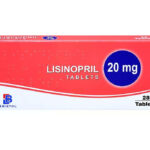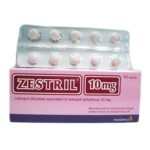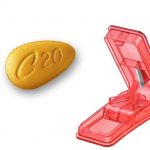Does Lisinopril Cause Erectile Dysfunction (ED)?

What is lisinopril?
Lisinopril is a prescription drug. It comes as an oral tablet and an oral solution. Lisinopril oral tablet is available as the brand-name drugs Prinivil and Zestril. It’s also available as a generic drug. Generic drugs usually cost less. In some cases, they may not be available in every strength or form as the brand-name version.
Lisinopril oral tablet is used to treat high blood pressure and heart failure. It’s also used to improve your chance of survival after a heart attack. This drug may be used as part of combination therapy. That means you may need to take it with other drugs.
How it works
Lisinopril belongs to a class of drugs called angiotensin-converting enzyme (ACE) inhibitors. A class of drugs is a group of medications that work in a similar way. They have a similar chemical structure and are often used to treat similar conditions.
This drug relaxes the blood vessels in your body. This reduces stress on your heart and lowers your blood pressure.
What is erectile dysfunction (ED)?
Erectile dysfunction (ED) refers to the inability to get and keep an erection firm enough for sexual intercourse. Estimates suggest that one of every 10 men will suffer from ED at some point during his lifetime. It is important to understand that in most cases, ED is a symptom of another, underlying problem. ED is not considered normal at any age and may be associated with other problems that interfere with sexual intercourse, such as lack of desire and problems with orgasm and ejaculation.
Approximately one in 10 adult males will suffer from ED on a long-term basis. Many men do experience occasional failure to achieve an erection, which can occur for a variety of reasons, such as drinking too much alcohol, stress, relationship problems, or being extremely tired.
The failure to get an erection less than 20% of the time is not unusual and typically does not require treatment. However, the failure to achieve an erection more than 50% of the time generally means that there is a problem and treatment is needed.
ED does not have to be a part of getting older. While it is true that some older men may need more stimulation, they should still be able to achieve an erection and enjoy intercourse.
Does lisinopril cause erectile dysfunction (ED)?
Yes, lisinopril can cause erectile dysfunction but this side effect is rare and occurs in less than 1% of people taking lisinopril. This is because ACE (angiotensin-converting enzyme) inhibitors like lisinopril work by widening blood vessels and increasing blood flow which can enhance erection.
If you think your ED is the result of the lisinopril you are taking, discuss it with your doctor. When ED becomes a routine and bothersome problem, your primary care provider or a Urologist can help.
ED may be a major warning sign of cardiovascular disease indicating blockages are building in a man’s vascular system. Some studies have shown men with ED are at significant risk of getting a heart attack, stroke, or circulatory problems in the legs. ED also causes:
- Low self-esteem
- Depression
- Distress for the man and his partner
If ED is affecting a man’s well-being or his relationships, it should be treated. Treatment aims to fix or enhance erectile function, help circulatory health and help the quality of a man’s life.
What side effects can this medication cause?
Lisinopril may cause side effects. Tell your doctor if any of these symptoms are severe or do not go away:
• cough
• decrease in sexual ability
• diarrhea
• dizziness
• excessive tiredness
• headache
• nausea
• rash
• runny nose
• sneezing
• weakness
Some side effects can be serious. If you experience any of these symptoms, call your doctor immediately:
- swelling of the face, throat, tongue, lips, eyes, hands, feet, ankles, or lower legs
- hoarseness
- difficulty breathing or swallowing
- fever, sore throat, chills, and other signs of infection
- yellowing of the skin or eyes
- lightheadedness
- fainting
- chest pain
Lisinopril may cause other side effects. Call your doctor if you have any unusual problems while taking this medication.
If you experience a serious side effect, you or your doctor may send a report to the Food and Drug Administration’s (FDA) MedWatch Adverse Event Reporting program by phone (1-800-332-1088).
Warnings
For people with kidney disease: If you have kidney disease or are on dialysis, you have a higher risk of having certain serious side effects from this drug. Your doctor will monitor your kidney function and adjust your medication as needed. Your doctor should start you on a lower dose of this drug.
For people with diabetes: This drug can affect your blood sugar levels. Your doctor may need to change the dose of your diabetes medications. Your doctor will tell you how often to test your blood sugar levels.
For pregnant women: This drug can have a negative impact on the development of a fetus. Lisinopril should only be used during pregnancy in serious cases where it’s needed to treat a dangerous condition in the mother.
Talk with your doctor if you’re pregnant or planning to become pregnant. Ask your doctor to tell you about the specific harm that may be done to the fetus. This drug should be only used if the potential risk to the fetus is acceptable given the drug’s potential benefit.
For women who are breastfeeding: It isn’t known if this drug passes into breast milk. If it does, it may cause side effects in a child who is breastfed. Talk with your doctor if you breastfeed your baby. You may need to decide whether to stop breastfeeding or stop taking this medication.
For seniors: Older adults may process drugs more slowly. A normal adult dose may cause levels of this drug to be higher than normal in your body. If you’re a senior, you may need a lower dose or a different schedule.
For children: This medication hasn’t been studied and shouldn’t be used in children younger than 6 years.





